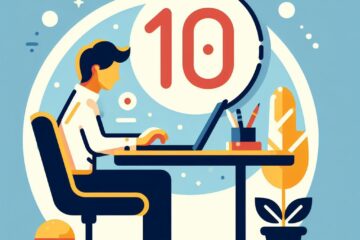In today’s fast-paced world, staying informed is important for making informed decisions, whether in our personal lives or professional endeavors.
However, with the constant influx of information from various sources, it’s easy to become overwhelmed and need help to keep up.
This article will explore practical strategies for staying informed without information overload.
Understanding Information Overload
Information overload occurs when the volume of available information exceeds our capacity to consume, process, and use it effectively.
It can cause stress, reduced productivity, and a sense of being overwhelmed. In today’s digital age, information overload is a common challenge, particularly with the rapid proliferation of news, social media, and online content.
The Importance of Staying Informed
Staying informed is crucial for several reasons:
- Informed Decision-Making: Being well-informed helps us make better decisions in both personal and professional life.
- Personal Growth: Access to diverse information fosters personal growth, broadening our knowledge and perspectives.
- Professional Development: Being up-to-date on industry trends and news is vital for professional growth and career success.
- Current Events: Awareness of current events and global issues enables us to engage in meaningful discussions and civic participation.
Effective Strategies for Staying Informed
Here are practical strategies to help you stay informed without becoming overwhelmed:
1. Prioritize Your Interests
Identify your fundamental interests and areas of focus. By narrowing down your interests, you can allocate your time and attention more effectively to the information that matters most.
Whether it’s business, technology, health, or politics, a clear focus helps filter out irrelevant information.
2. Set Information Goals
Establish specific information goals to guide your consumption. Define what you want to learn or achieve through your information intake. For example, your goal might be to stay updated on industry trends or to become more knowledgeable about a particular topic.
3. Curate Your Sources
Choose reliable and reputable sources of information. Be selective about the news outlets, websites, blogs, and social media accounts you follow. Opt for sources known for their accuracy and integrity to reduce exposure to misinformation.
4. Create a Reading List
Maintain a reading list or bookmark articles, reports, or books you intend to explore later. This allows you to collect valuable resources without feeling pressured to consume them immediately.
5. Limit Your Consumption
Set specific time limits for consuming information. Designate periods during the day or week for catching up on news, reading articles, or watching informative videos. Avoid mindless scrolling or constant checking of news feeds.
6. Use Aggregators and Filters
Utilize content aggregators and filtering tools to streamline your information intake. These can help you organize and categorize content, making accessing what’s most relevant to you easier.
7. Embrace Summarization
Look for summaries, abstracts, or executive briefings of lengthy reports or articles. These concise versions often provide the essential points without the need to delve into every detail.
8. Employ Information Filters
Leverage filters and search algorithms to tailor your information feed. Many platforms and apps allow you to customize your content preferences, ensuring you receive updates aligned with your interests.
9. Unsubscribe and Unfollow
Regularly review your email subscriptions, social media follows, and news notifications. Unsubscribe or unfollow sources that no longer align with your interests or provide value.
10. Diversify Your Sources
You should ask for a variety of perspectives and sources to avoid information bias. Expose yourself to different viewpoints and opinions to understand a topic better.
11. Practice Critical Thinking
Develop critical thinking skills to assess the reliability and credibility of information. Verify facts, check sources, and be cautious of sensationalized or biased content.
12. Limit Notifications
Minimize the number of notifications you receive—Disable non-essential notifications on your devices and apps to reduce distractions and interruptions.
13. Set Boundaries
Establish boundaries for information consumption. Avoid checking news or work-related emails during your time, such as meals or relaxation periods.
14. Engage in Discussion
Be a part of discussions with peers, colleagues, or online communities. Sharing and discussing information can deepen your understanding and provide valuable insights.
15. Take Breaks
Regularly disconnect from information sources to recharge. Engage in activities that allow your mind to rest, such as meditation, exercise, or hobbies.
16. Avoid Information Before Bed
Refrain from consuming information right before bedtime. Exposure to screens and stimulating content can interfere with sleep quality.
17. Learn to Say No
Recognize when you’ve reached your information saturation point. It’s okay to decline additional information intake when you feel overwhelmed.
18. Reflect and Apply
Apply the information you consume in practical ways. Reflect on how it can benefit your personal or professional life and take actionable steps based on your newfound knowledge.
Conclusion
Staying informed is essential in our rapidly evolving world, but it doesn’t have to lead to information overload.
You can stay well-informed by prioritizing your interests, setting goals, curating sources, and employing effective strategies while maintaining a sense of control and balance.
Remember that the goal is not to consume all available information but to choose wisely and use the knowledge you acquire to enhance your life and decision-making.




